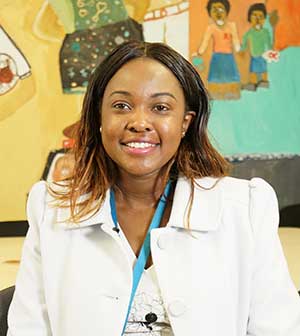Dr Nadia Ikumi Wins New Investigator Award


The New Investigator Award was used as a travel scholarship to attend CROI 2019 meeting held at the Washington State Convention Center, Seattle, USA, with a waived conference registration fee and discounted hotel rates at the conference.
Nadia was selected to give a poster presentation on ‘The Impact of HIV exposure on placental pathology and Treg cells.’ These are findings on placentas from the larger DolPHIN-2 (Dolutegravir in Pregnant HIV mothers and their neonates.) a Phase III clinical trial whose findings were also presented at the meeting.
We interviewed Dr Nadia Ikumi about her impressions of the CROI meeting and her research.
Impressions of the CROI Meeting:
The conference had several parallel sessions running concurrently, but my main interest was in the lab science on viruses. I was quite fascinated by the novel prospects on the engineering of viromes as a path to functional cure, and the efforts towards understanding the distribution of HIV reservoirs in the body. There were also a number of studies on HIV associated cancers, non-communicable diseases and reports on randomised clinical trials comparing alternative HIV drug regimens in comparison to standard of care across different settings.
Brief summary of your research:
My research is based on the premise that HIV and/or antiretroviral treatment exposure can result in an adverse birth outcome like preterm birth. Towards this, I have been studying human placentas, as this is the only link between a mother and her unborn child. The aim is to understand the immune dysregulation at the maternal foetal interface and link this to the risk of an adverse birth outcome in a setting of HIV and/or ART drug exposure. The cells of interest are regulatory T cells, which have been shown to play a key role in the maintenance of an optimal pregnancy.
Why do you work in immunology?
Immunology is fascinating. I enjoy studying different components of the immune system and understanding how they interplay. Pregnancy immunology is a different ball game, because the mother and her child have to co-exist without any rejection; yet the baby shares genes from both its parents.
What would you would be if you weren’t an immunologist?
I would have been a science journalist and a chef.
What is the best advice for young immunologists?
Keep your scientific story simple. Simple enough for the world at large to understand the complexity of your findings. It is always tempting to use the technical terms, as we feel that any deviation could result in a ‘watered down’ effect but what we really need to do is keep the story simple.
Article by Bonamy Holtak
